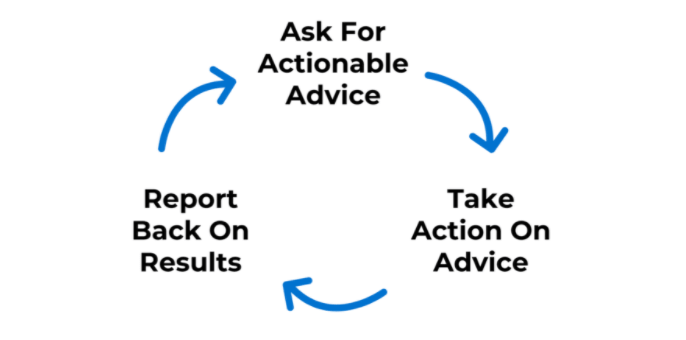Your company’s employee training may be great. But it won’t always prepare you to take your career to the next level — at least not in all the ways you want. Sometimes you need to take matters into your own hands to advance your career.
Need some advice on what you can do to prepare? In this post, I’m sharing 8 of my favorite career advancement strategies that can help you take your career to the next level!
Learn How To Advance Your Career
Here’s a quick overview of what we’ll cover in this post:
- Create SMART career goals
- Share your goals with your network
- Ask for feedback often
- Improve your soft skills
- Plan for a promotion before asking for one
- Make a 30-60-90 day plan
- Build and nurture your network
- Prioritize growth over comfort
Let's get started!
Strategy #1: Create SMART Career Goals
You’ve likely already set goals for your career. But how many of those goals sound great yet, still, for whatever reason you don’t get around to achieving them? This scenario is a common problem with goal setting. Here’s the solution: SMART goals.
SMART is an acronym that stands for Specific, Measurable, Achievable, Relevant, and Time-Bound. From now on, you need to make sure your career goals have all of those characteristics.
Here’s an example of an uninspiring career goal followed by its SMART equivalent:
Uninspiring goal: “I want to get a job as a Senior Analyst at a top consulting firm.”
SMART goal: “Reach out to contacts at the top three consulting firms by the end of the week to get insights on the hiring process for senior analysts. Use what I learn to create three relevant value validation projects to submit with my applications by the end of the month.”
See the difference? The second one is much more likely to lead to action. So, write your SMART goals down. Post them somewhere you can see them daily. And get to work!
Strategy #2: Share Your Goals With Your Network
You can achieve some of your goals on your own. But many of them — especially the most ambitious goals — might require some help. Or at least help will allow you to achieve them faster.
So, don’t hide your goals. Your trusted network should know what you’re working to achieve. They should know what obstacles stand in your way. That way, if they encounter or know of a solution, you’re top of mind.
How do you share your goals without being annoying? Easy. You ask people about their own goals, try to help them find solutions, and then rely on the principle of reciprocity. It will make sharing and asking for help achieving your goals feel less awkward. In fact, you probably won’t even need to ask!
Strategy #3: Ask For Feedback Often
No one likes to be criticized for their work. It’s uncomfortable. But constructive feedback is how you grow the quickest. So, you need to seek it out often and regularly. From who? Anyone who relies on the effectiveness of your work. This could be your boss, a colleague, a client, your assistant — anyone.
To get useful feedback, ask targeted questions. For example, you can ask questions like, “What’s something you think I could do more effectively?” or “What can I change about my work so that it makes your job easier?”. Take notes of their responses. Decide what’s useful and what’s not. Then create a SMART goal to start improving.
Strategy #4: Improve Your Soft Skills
Everyone focuses on improving technical skills. This makes sense because those types of hard skills are important for getting certain careers. But, if you want access to the best opportunities to advance your career, those hard skills will only get you so far.
That’s why you need to prioritize your soft skills just as much. Which soft skills should you prioritize? Well, that depends on your desired career path. For example, if you want a leadership role, then you may need to work on skills like public speaking, rapport building, delegation, and time management.
You may think people are born with these skills. But they’re not. Just like hard skills, soft skills require practice — which is great news. Because it means you can learn and improve them, too. No natural talent required!
Strategy #5: Plan For A Promotion Before Asking For One
Don’t wait around hoping that one day you’ll get a promotion. That’s too passive and is never guaranteed — even if you deserve it. You have to be proactive. In my guide on how to get a promotion, I walk you through 7 steps to make it undeniable to your boss that you deserve a promotion.
Read that post if a promotion is currently part of your career progression plan. For convenience, here are the 7 steps:
- Begin documenting your success and work achievements
- Tell your career goals to your boss and get their advice on how to achieve them
- Take action on their advice for 3-6 months
- Update your success document with your progress from that advice
- Schedule a follow-up meeting to discuss that progress with your boss
- Rehearse how you’ll talk about your progress and a potential for a promotion
- Confidently ask for the promotion
As you probably noticed, this plan requires starting at least 3-6 months in advance. So, if you see an opportunity for a promotion coming up soon, start today!
Strategy #6: Make A 30-60-90 Day Plan
A 30-60-90 day plan is one of the best ways to monitor and track the progression of your goals. Oftentimes, people wait until their boss asks them to create one. But you can make one for yourself right now and use it as a guide to advance your career in the next 3 months!
Within the plan, break down your career goals into actionable steps. Then, start chipping away at them. When done correctly, your plan also becomes something you can show your boss when asking for a promotion or salary raise. If you’re not sure which goals to add to your plan, try finding a career map for your career path.
And if you’re interviewing for a new job, a 30-60-90 day plan is also a great way to really demonstrate the value you’d bring to the job. And since most job seekers won’t do this, it’s a great way to set yourself apart from the competition!
Strategy #7: Build And Nurture Your Network
You already know that having a strong network is beneficial to your career. So, why include it here? Because most people don’t know how to do it in a way that goes beyond checking in and meaningless small talk.
In my guide on how to network, I share 4 of my favorite strategies that I’ve used to build and get the most from my network. Here’s a quick rundown of those networking strategies to get you started:
- Recognize potential new contacts for recent achievements in their career rather than making your outreach focused on you
- Support your existing and desired network on social media platforms like LinkedIn and Twitter by leaving thoughtful comments
- Follow publicly shared advice from someone you’d like to connect with and then share with them a full testimonial-like breakdown of how their advice helped you
- Start an “Advice Triangle” in which you initiate a conversation with your contact by asking for advice, taking action on that advice, reporting back on that advice, and repeat.
Strategy #8: Prioritize Growth Over Comfort
Sharing your goals invites criticism. Asking for feedback feels awkward. Sending cold emails to people who may not respond isn’t fun. But this is how you grow. So, accept now that you probably won’t feel comfortable executing any of these strategies to help you advance your career.
You know who’s most likely to endure the pain and reach success? The people (hopefully you) that are on a career path that’s the right fit. In other words, the people who are motivated by the idea of what they can achieve if they give their current career their all.
If that’s not you, that’s okay. You still have time. And you’re not alone. According to a recent study, 52% of working adults are considering making a career change in 2021.
So, if you realize that the best thing you can do to advance your career is change careers, take action. Again, making it happen will likely feel uncomfortable. But when you reach the point where you’re working on something you actually enjoy, you’ll know it was all worth it.
Final Thoughts
You’re capable of advancing to the highest level of your career. But, oftentimes, to get there you’ll need to be strategic and persistent. Use the 8 tips I’ve shared here to guide you along the way.
And if you find that the best way to advance your career involves getting a new job or embarking on a new career path, check out my tips on how to land a job without applying online!




























